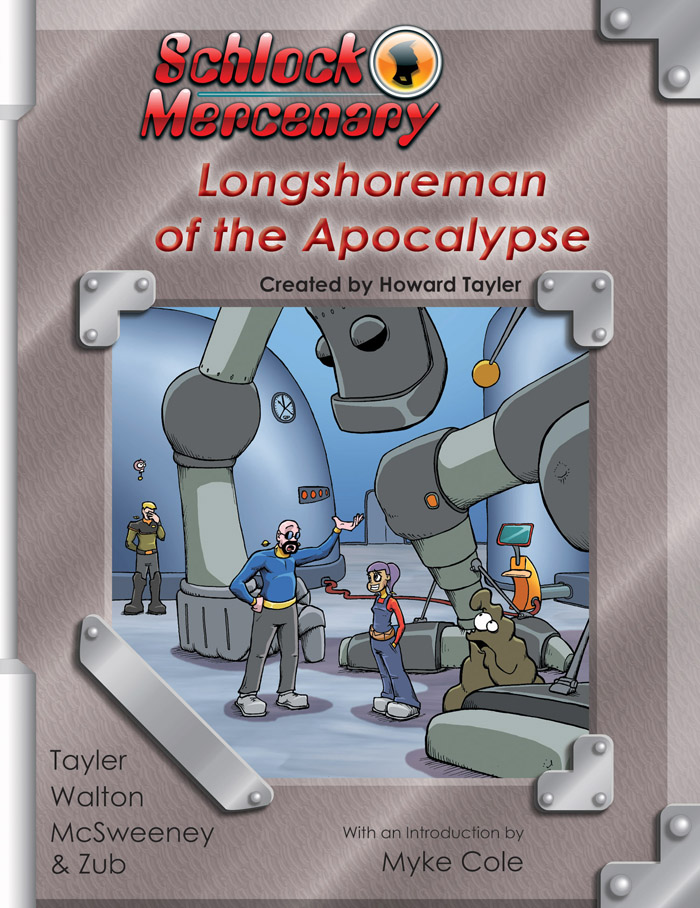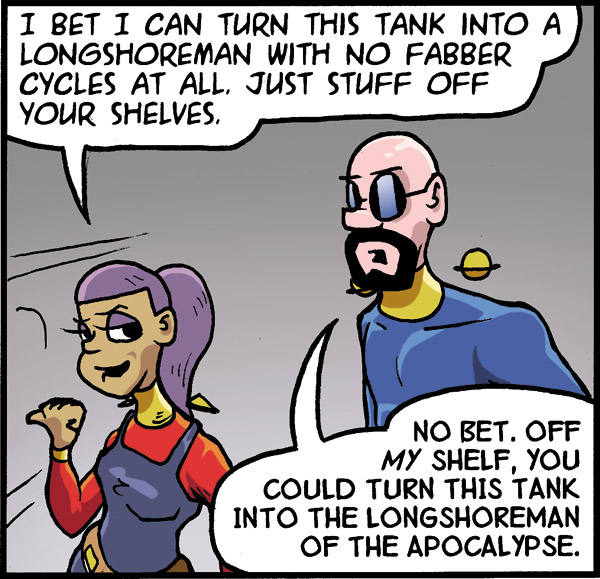 Howard Tayler is joining us today with his book Longshoreman of the Apocalpyse. Here’s the publisher’s description.
Howard Tayler is joining us today with his book Longshoreman of the Apocalpyse. Here’s the publisher’s description.
The Longshoreman of the Apocalypse follows the crew of the mercenary ship Touch-and-Go through what should have been a routine food delivery to the Credomar habitat, a human space colony that’s having some—a lot—of political problems. The contract didn’t mention the political problems. Through various stages of combat and comical mishaps, the Touch-and-Go crew tries to stay alive and deliver the food to somebody, without being sued into oblivion.
What’s Howard’s favorite bit?

HOWARD TAYLER
The First Law of the Schlock Mercenary universe is “There must always be a punch line.”
You, fair reader, are probably well enough traveled to not be surprised at the amount of trouble this causes me. You may, however, be amused to learn that this ever-dropped wrench, this open manhole cover on the darkened sidewalk of my creative process is, in point of fact, my favorite bit.
Of course, given the title of this feature, maybe that doesn’t surprise you at all. You saw that coming. It’s a promise made up front, so you’re waiting for it to be fulfilled. More on that in a moment…
I’m much more of a discovery writer than an outliner. I dream up a few awesome bits like “walking artillery shots across a cityscape” or “flying a spaceship indoors” ahead of time, and then I aim the story at them as best I can while creating day after day of comics.
The fun hijinks I’d planned for the tenth Schlock Mercenary book, set in a rotating space-city of thirty-ish million people, required quite a bit of setup. I knew where the conflicts would be, and I had a pretty good idea of how the end would shake out, and while my process may seem frighteningly loose to the hard-core outliners, it really was just business as usual for me.
And then, mid-book, I crafted a punchline.
PARA (the young roboticist) “I bet I can turn this tank into a longshoreman with no fabber cycles at all. Just stuff off your shelves.”
KEVYN (the mad scientist) “No bet. Off my shelves you could build the Longshoreman of the Apocalypse.”

That joke resonated. People loved it. Unfortunately it suggested–no, PROMISED–levels of violence and disaster that I had not really planned, and in a rotating space-city there aren’t many apocalypse-level disasters that don’t result in everybody dying.
Part of me was aware of this at the moment I wrote that scene, but my other parts only came around to facing the issue when, during my writing group, I bemoaned the promise I seemed to have made. The loud and immediate consensus was that I didn’t SEEM to make a promise. I ABSOLUTELY made a promise, and if I did not keep that promise I was a bad writer and a horrible person and the Internet might fire me.
And that, right there? That’s my favorite bit: that point at which I’ve published something delightful, and I can’t change it, but it’s raised a bar that I already thought might be a little high for me to clear.
All the awesome moments I had planned for the tenth book, all the hijinks for which I’d carefully laid groundwork? Those pieces all now had to stand in support of the book’s new title, LONGSHOREMAN OF THE APOCALYPSE.
I don’t actually jump over bars, or jump out of airplanes, or really do anything much more dangerous than driving my own automobile. I take great pains to never personally experience favorite bits that involve adrenaline and life-or-death. But I do get a rush out of not being able to back down from a story challenge.
I don’t know what your favorite bit of this book might be, but it’s possible you’ll find it in the pages of explosive justification surrounding this line of narration from Act III:
“This is the Longshoreman of the Apocalypse. He now has an apocalypse to preside over.”
That’s not a spoiler. Now that the book has a proper title the Apocalypse Promise is right up front. The Internet has not yet fired me, and from my association with fine citizens like Mary you can assume that I am not a horrible person. You know I’m going to keep that promise.
How I got myself into the mess was my favorite bit. How the characters get themselves out of the mess might be yours.
LINKS:
http://store.schlockmercenary.
Every copy ordered between now and June 3rd will be signed on the cover.
You can read the entire story of Longshoreman of the Apocalypse online for free starting here: http://www.schlockmercenary.
BIO:
Howard Tayler is the writer and illustrator behind Schlock Mercenary, the Hugo-nominated science fiction comic strip. Howard co-hosts the Hugo and Parsec award-winning “Writing Excuses” podcast, a weekly ‘cast for genre-fiction writers, with Mary Robinette Kowal, Brandon Sanderson, and Dan Wells. His most recent printed work is Schlock Mercenary: Longshoreman of the Apocalypse which was on the 2010 Hugo ballot.

Another nice fallout from that punchline was that the Longshoreman Of The Apocalypse became known as LOTA.
It’s the perfect name for someone who is persnickety about puny pronouns.
And there’s even the song: “her name was LOATA, LO – TA, LOATA”.
..all from the implications of a punchline. I love it.
Creativity isn’t hindered by obstacles, rather the opposite!
Just like poets have written beautiful prose in horribly complex meters, or composers (I’m thinking of you, J.S.Bach) wrote fugues, programmers (and particularly low-level machine code/asm hackers) delight in finding the best way to get the most out of sometimes very limited resources.
(You have to read “The Story of Mel” if you haven’t already done so!)
When you have an embarrassment of riches, it is much harder to decide upon the best solution: Currently I’m trying to come up with optimal code for a still not existing architecture, where I can ask for specific helper operations to be implemented in hw: If they turn out to be easy to build I might get them, otherwise I’ll have to find another pure sw solution.
PS. Yes, I have ordered two copies of this book (one for me and one for my son), just like I did for all the previous books. 🙂